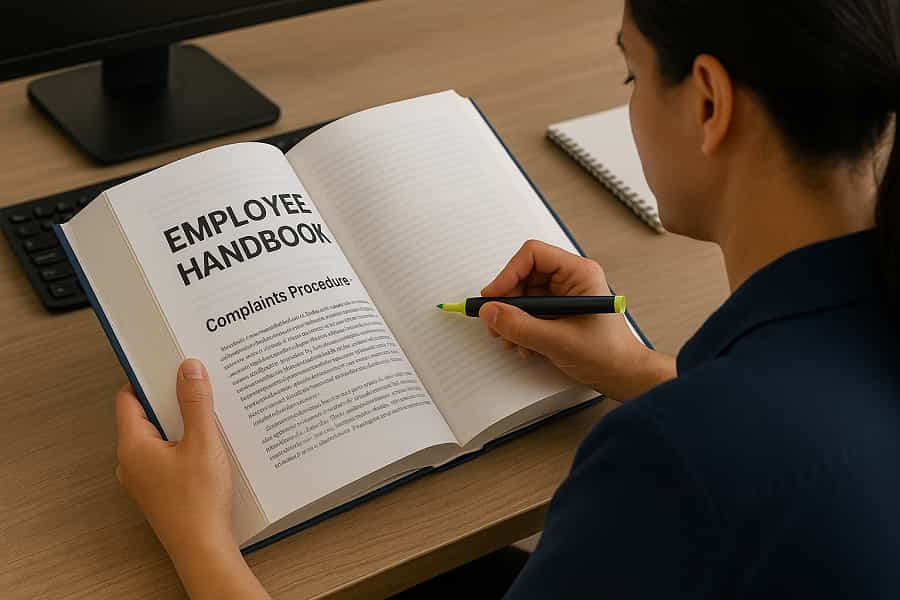Complaints Procedure in the Workplace
Your voice matters at work. If you need to raise an issue formally, this page explains the official complaint process and sets out a clear, step‑by‑step complaint filing route you can follow. Throughout, you will find direct ways to get help, get support and sign up for membership with The Workers Union so you are never handling a complaint alone.
When to use the formal complaints procedure
Use a formal complaints procedure when:
- Your concerns have not been resolved informally, or the issue is serious (for example, bullying, discrimination, health and safety risks, or unfair treatment)
- You need a written record and a clear timeline of actions
- You want the matter investigated under your employer’s policies
If you are unsure whether to make an official complaint, contact us to get help and get support. We will guide you on the options available and how to prepare effectively.

Step-by-step: How to make a Formal Complaint
- Prepare your evidence
Gather dates, times, emails, messages, witness details and any relevant policies. Keep notes that are factual, chronological and neutral. This will strengthen your complaint filing and help your employer understand what needs to be investigated.
- Check your employer’s policy
Most employers publish a written complaint procedure (often called a grievance policy). Read it carefully to confirm who to write to, any forms required, and the time limits for raising concerns.
- Draft your complaint
Your written complaint should be clear and concise. Include:
- What happened, where and when
- Who was involved and who witnessed it
- The impact on you and your work
- What outcome you are seeking (for example, an apology, changes to process, training or other remedies)
If you need help with this, join The Workers Union to access practical resources and tailored support.
- Submit the complaint
Send your document to the named manager or HR contact as set out in the policy. Mark it as an official complaint and request acknowledgement of receipt. Keep a copy.
- Attend meetings and share information
You may be invited to a meeting to discuss your concerns. Keep your notes handy, answer questions directly and request a written summary of the discussion. If new issues emerge, ask that they are added to the investigation record.
- Receive the outcome
You should receive a written outcome that explains the findings and any actions. If you disagree, the policy should set out how to appeal and the deadline for doing so. Acting within the time limit is essential.
Need help now? Register with The Workers Union and sign up for full membership to get one‑to‑one guidance and practical support.
How to handle a complaint professionally (for managers)
- Acknowledge receipt promptly and explain next steps and timelines
- Keep the process confidential and fair to everyone involved
- Investigate thoroughly: gather evidence, interview relevant people and consider policies
- Communicate clearly and provide regular updates
- Provide a reasoned written outcome and explain any right of appeal
If you are managing a complaint and need guidance on best practice, contact The Workers Union to get support.
How to deal with a complaint as an employee
- Stay factual, organised and calm; avoid speculation or inflammatory language
- Follow the policy steps and meet deadlines
- Keep copies of everything you send and receive
- Seek advice early; informed decisions lead to better outcomes
Where appropriate, continue to complete your day‑to‑day duties and maintain professionalism throughout the process.
Fairness, timescales and confidentiality
A fair formal complaints procedure should be prompt, impartial and transparent. Employers should set realistic timeframes and keep you updated if more time is needed. Your information should be handled confidentially and only shared with those who need to know. If you feel the process is not being followed, reach out to us to get help.
Get help now
The Workers Union is here for UK workers. If you need practical advice or want ongoing assistance:
- Join today for dedicated support
- Register for help guidance on how to handle a complaint
- Sign up for full membership to access support, checklists and priority help
- Get immediate support with a confidential review of your situation
FAQs
Put your concerns in writing, include key facts and desired outcome, check your employer’s policy for who to send it to, and keep copies. If you are unsure, contact The Workers Union via your personalized dashboard to get support.
Send a polite follow‑up and ask for confirmation of receipt. If there is still no response, reach out to The Workers Union on next steps to take using your membership.
Yes, if new information emerges, ask for it to be added to the investigation record. Keep everything documented.
Timelines vary, but the process should be prompt and you should receive regular updates. If delays occur, request an explanation and a revised timescale.
Use the appeal stage within the deadline stated in the policy. Explain clearly why you disagree and what you are asking the employer to reconsider.



